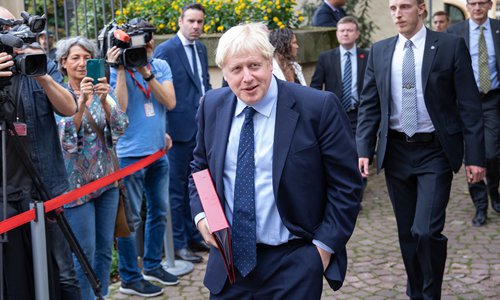HOME >> WORLD
Court deals blow to Johnson
Source:AFP Published: 2019/9/24 21:33:40
Says British PM unlawfully suspended parliament

British Prime Minister Boris Johnson Photo: VCG
Britain's Supreme Court ruled Tuesday that Prime Minister Boris Johnson acted unlawfully in suspending parliament in the run-up to Brexit, in a stunning blow that sparked immediate calls for him to resign.The ruling is a huge blow to Johnson's authority and casts further doubt on his vow to leave the European Union on October 31 even without a deal with Brussels.
The Speaker of the House of Commons, John Bercow, immediately announced that MPs would reconvene on Wednesday morning.
The Conservative leader, who is currently in New York, told British media he "strongly disagreed" with the decision but said he would respect it.
Johnson had argued that shutting down parliament until October 14 was a routine move to allow his new government to set out a new legislative program.
But critics accused him of trying to silence MPs ahead of Britain's scheduled exit from the European Union on October 31 - the terms of which remain unclear.
"The court is bound to conclude... that the decision to advise Her Majesty to prorogue was unlawful," Supreme Court President Brenda Hale said.
She said this was "because it had the effect of frustrating or preventing the ability of parliament to carry out its constitutional functions."
She said the suspension was as a result "void and of no effect," adding: "Parliament has not been prorogued."
The Speaker of the House of Commons, John Bercow, said MPs should reconvene immediately.
The judges "have vindicated the right and duty of parliament to meet at this crucial time to scrutinize the executive and hold ministers to account," Bercow said.
The ruling is a major blow to Johnson, and sparked calls for him to stand down.
"I invite Boris Johnson, in the historic words, to consider his position, and become the shortest serving prime minister there has ever been," main opposition Labour leader Jeremy Corbyn said.
The Westminster leader of the Scottish National Party, Ian Blackford, said: "We must be back in parliament immediately.
"We want to get back to work. On the back of this, Boris Johnson must resign."
Johnson, who took office on July 24, had advised Queen Elizabeth II as head of state to prorogue parliament, which then took place early on September 10.
He insisted it was a long-overdue move unrelated to Brexit, but it sparked accusations that he was trying to avoid scrutiny from a hostile parliament.
Most members of the House of Commons oppose Johnson's threat to leave the European Union next month even if he has not agreed exit terms with Brussels.
Posted in: EUROPE